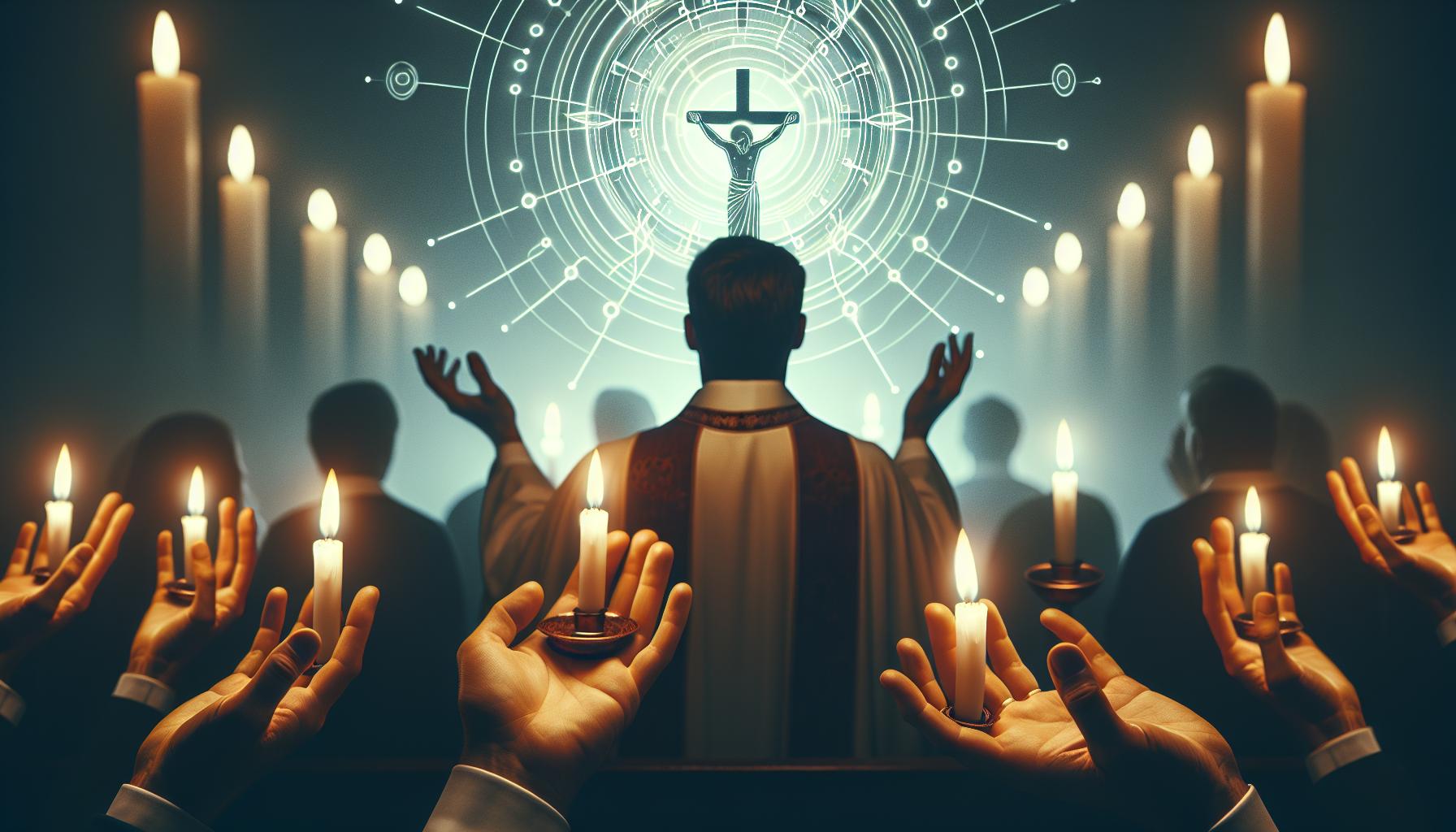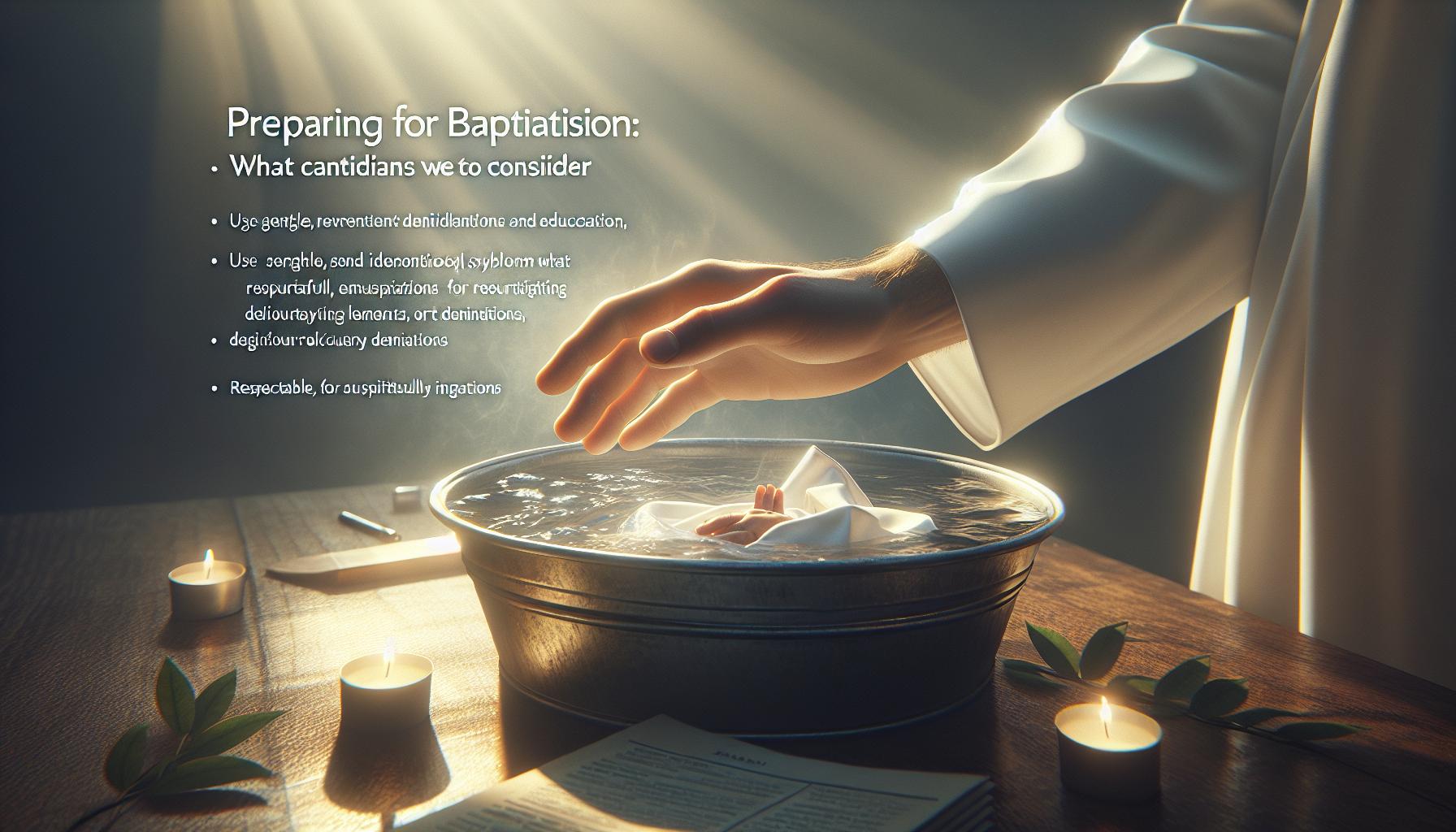As new parents embark on the transformative journey of baptism, they often ponder what vital questions pastors will ask during the preparation process. These inquiries shape the significance of the sacrament and ensure that both candidates and families understand their responsibilities in nurturing a faith-filled life. Exploring these preparation questions is essential for grasping the profound implications of this sacred ceremony.
Understanding the Significance of Baptism in Christian Faith
Understanding the significance of baptism in the Christian faith is essential, as this sacred rite marks a transformative entry into a new life and community. Baptism is not merely a ritual or cultural tradition; it resonates deeply with the foundational beliefs of Christianity, signifying the believer’s identification with the death, burial, and resurrection of Jesus Christ. According to Romans 6:4, “We were therefore buried with him through baptism into death in order that, just as Christ was raised from the dead… we too may live a new life.” This passage encapsulates the profound importance of baptism as a symbol of rebirth and renewal.
When considering the preparation for baptism, pastors often engage candidates with pivotal questions that probe their understanding and commitment. These inquiries aim to confirm the individual’s faith and readiness to publicly declare their beliefs. Typical questions may include:
- What does baptism mean to you?
- How did you come to faith in Jesus Christ?
- Are you ready to commit to living as a follower of Christ?
These dialogues not only help candidates reflect on their spiritual journey but also prepare them for the responsibilities of their new life in faith. By addressing the meaning and expectations of baptism, pastors guide individuals toward a deeper understanding of their commitment to the Christian community and to God.
Moreover, within this sacramental act lies an invitation to join a larger baptized community. Baptism signifies inclusion in the church, where believers collectively share in worship, service, and fellowship. This communal aspect reinforces that baptism is not just about personal faith; it honors communal identity and shared belief. As individuals step into the waters of baptism, they immerse themselves in a historical and spiritual legacy that connects them to a myriad of believers throughout centuries.
The discussions that pastors facilitate before baptism serve as a pivotal moment for candidates. By clearly articulating their faith and intentions, candidates prepare not only for the act itself but also for the ongoing journey of discipleship that follows. This preparation process exemplifies the broader significance of baptism: it is both a personal milestone and a communal entrance, marking the beginning of a transformed life in Christ.
Key Questions Pastors Ask: Assessing Spiritual Readiness
Determining a candidate’s spiritual readiness for baptism is a pivotal step in the journey of faith, not only for the individual but also for the community receiving them. Pastors play a crucial role in this assessment through a series of intentional questions aimed at gauging the candidate’s understanding, commitment, and spiritual growth. This process ensures that baptism is not merely a ritual but a meaningful expression of faith and transformation.
Understanding the Candidate’s Faith Journey
One of the first aspects pastors examine is the candidate’s understanding of their faith. Pastors often ask questions such as:
- Who is Jesus to you?
- What does it mean to you to be a Christian?
- Can you share a pivotal moment in your spiritual journey?
These questions help uncover the individual’s personal relationship with Christ, providing insight into their readiness. Successful candidates typically demonstrate a clear grasp of the basic tenets of their faith and an active engagement in their spiritual journey.
Assessing Commitment and Intentions
Commitment is another critical area of focus during this assessment. Pastors may inquire:
- What motivated you to seek baptism at this time?
- How do you plan to live out your faith after baptism?
- Are you willing to become an active part of our church community?
These questions aim to ensure that candidates are not just pursuing baptism for social reasons or at the behest of others but are genuinely seeking to follow Christ and become part of the church. This commitment to active participation reinforces their readiness.
Encouraging Personal Reflection
Pastors often encourage candidates to reflect on their personal experiences and how they align with biblical teachings. This can include questions about past behaviors and changes made, such as:
- How has your understanding of sin and repentance evolved?
- What changes have you made in your life since becoming a believer?
This reflective process helps candidates articulate their spiritual growth, thereby deepening their understanding of baptism’s significance as a public declaration of faith.
By thoughtfully engaging in these discussions, pastors are equipped to assist candidates in voicing their readiness for baptism. The questions posed in this critical preparatory phase enhance both the candidates’ understanding and the integrity of the baptismal process, ensuring that it aligns with the broader church mission to foster genuine discipleship and community.
The Role of Personal Testimony in the Baptism Process
Sharing a personal testimony during the baptism process can significantly enhance the emotional and spiritual depth of the experience for both the candidate and the congregation. A personal testimony offers a glimpse into the transformative journey of faith, making the sacred ritual of baptism more relatable and impactful. When candidates articulate their stories, they connect their individual experiences to the larger narrative of God’s work in the world, thereby fostering a shared sense of community and purpose.
Connecting with the Audience
Engaging the congregation through personal testimony allows individuals to convey how their lives have been changed by faith. It becomes an opportunity to communicate key elements of their spiritual journey, such as:
- The Turning Point: Describing the moment or series of events that led to their decision to follow Jesus.
- The Impact of Faith: Highlighting specific changes in behavior, attitudes, or life direction since embracing faith.
- The Role of Baptism: Articulating what baptism symbolizes for them personally and its significance in their faith journey.
These elements not only personalize the baptism experience but also resonate with others who may be on similar paths, showcasing the power of vulnerability and authenticity.
Encouraging Community Support
A well-shared testimony fosters a supportive environment for those being baptized. As candidates openly express their thoughts and emotions, they encourage the congregation to actively engage in their spiritual development. This communal participation is vital, as it strengthens the collective faith and creates an atmosphere of encouragement and celebration.
In preparing for baptism, candidates may be asked various questions by pastors, some of which focus explicitly on personal testimony. This dialogue ensures that their stories are not only heard but also understood within the context of a faith community. By preparing answers to questions about their backgrounds and spiritual experiences, candidates can frame their testimonies in a way that highlights the significance of their decision to be baptized, thus enhancing the overall impact of the service.
The act of sharing personal testimonies during baptism underscores one of the central themes of Christianity: transformation through faith. Each story told during this process is a testament not only to individual change but also to the broader work of God within the church community. By recognizing and celebrating these transformative experiences, churches live out their commitment to spirituality, fellowship, and spiritual growth, as described in discussions surrounding what pastors ask before baptism and important preparation questions.
Preparing for Baptism: What Candidates Should Consider
Preparing for baptism is a significant step that requires thoughtful consideration and understanding. For candidates and their families, it’s not just about the ceremony; it’s about embracing a new life in faith. Many pastoral traditions emphasize the importance of preparation, as it helps individuals grasp the profound commitment they’re making. Before participating in this sacred rite, candidates should reflect on several key questions.
Reflection on Faith
One of the primary areas to consider is an understanding of one’s faith. Pastors often inquire about the candidate’s belief in Christ and the implications of baptism in their spiritual journey. Candidates should contemplate the meaning of accepting Jesus into their lives, acknowledging the importance of repentance and commitment to living according to Christian values. It’s beneficial to have discussions with mentors or church leaders who can guide these reflections.
Understanding the Role of Godparents
Choosing godparents is another important aspect that candidates should consider carefully. These individuals play a crucial role in nurturing the child’s spiritual development. Pastors typically ask about the godparents’ commitment and readiness to support the candidate in their faith journey. Families should select godparents who are not only spiritually mature but also willing to engage actively in the life of the candidate. Engage in conversations about faith, responsibilities, and the expectations that come with this role.
Preparation Opportunities
Many churches offer preparation classes that serve as informative sessions for candidates and their families. These classes provide insights into what baptism represents and the responsibilities that follow. Families are encouraged to participate actively in these sessions, making the experience more enriching and meaningful. Here are some actionable steps to consider:
- Read about the significance of baptism in your church tradition.
- Discuss the implications of baptism with your pastor or spiritual leader.
- Attend a baptism class or workshop to clarify any doubts and deepen your understanding.
By taking these steps, candidates can enter the baptismal waters with confidence, fully aware of the commitment they are making and the community they are joining. Engaging with the questions pastors ask can lead to a more enriching experience, nurturing both the individual’s faith and their bonds with the church community.
Theological Foundations: Exploring Scripture’s Teachings on Baptism
The significance of baptism in Christian communities is deeply rooted in Scripture, serving as a powerful testament to faith and obedience. When preparing individuals for baptism, pastors often turn to biblical teachings to convey its importance and the theological foundations underpinning this sacred act. At its core, baptism symbolizes a believer’s identification with Christ in His death and resurrection, a theme vividly illustrated in Romans 6:3-4, where Paul emphasizes that through baptism, we are buried with Christ and raised to a new life. This spiritual transformation serves as a focal point for the questions pastors ask before baptism, ensuring candidates have a clear understanding of their commitment.
Another pivotal aspect of baptism is its role as a public declaration of faith. In Matthew 28:19-20, known as the Great Commission, Jesus commands His followers to make disciples of all nations, baptizing them in the name of the Father, the Son, and the Holy Spirit. This command underscores the importance of not only personal belief but also the communal aspect of faith. Pastors typically explore candidates’ motivations for baptism, asking questions that encourage reflection on their relationship with God and their readiness to publicly affirm their faith.
To facilitate a deeper understanding, it can be helpful to consider the various dimensions of baptism reflected in Scriptures:
| Dimension | Scriptural Reference | Significance |
|---|---|---|
| Identification with Christ | Romans 6:3-4 | Symbolizes dying to sin and rising in new life. |
| Public Declaration | Matthew 28:19-20 | Serves as a commitment to following Christ. |
| Receiving the Holy Spirit | John 1:33; Matthew 3:11 | Marks the beginning of a new spiritual journey. |
Moreover, the act of baptism is often associated with repentance and a renewed identity within the faith community. Acts 2:38 emphasizes the call to repentance followed by baptism, reinforcing the belief that this sacrament is not merely a ritual but a transformative step reflecting a sincere commitment to living according to Christ’s teachings. Pastors, when preparing those for baptism, may ask probing questions that help candidates articulate their understanding of repentance and their desire to embrace Christ’s message.
By examining these theological foundations, pastors can ensure candidates not only meet the requirements for baptism but also possess a comprehensive understanding of what it signifies for their lives moving forward. This preparation lays the groundwork for a lifelong journey of faith, rooted in the teachings of Scripture and the transformative power of Christ.
Involving the Community: The Church’s Role in Baptism Preparation
When families prepare for baptism, they often find themselves navigating a deeply communal experience, grounded in the shared beliefs and values of their church. The role of the church in baptism preparation is crucial; it is not merely a formality but a meaningful journey that unites the family, the godparents, and the wider congregation in a shared mission to guide the child in their faith. This community aspect can significantly enrich the baptism experience, transforming it from a rite of passage into a powerful symbol of connection and support.
One of the ways the church fosters this community involvement is through organized preparation sessions, where potential godparents and parents gather to learn more about the significance of baptism. During these gatherings, church leaders often discuss common inquiries such as “What do pastors ask before baptism?” This approach not only clarifies the expectations for godparents and parents but also encourages open dialogue among families, building a sense of camaraderie and shared purpose. The preparation may involve
- Group discussions
- Workshops on faith teachings
- Opportunities for personal reflection
, all focused on deepening the understanding of the sacrament and its impact on the child’s spiritual life.
In addition to educational components, the church community actively participates in the baptism ceremony itself, emphasizing the child’s entrance into a larger faith family. Each family is encouraged to invite friends and loved ones, creating an atmosphere of joy and celebration. This is not just a personal milestone; it symbolizes the child becoming part of the Christian community at large. Many pastors emphasize this point during the preparations, highlighting the importance of community support in nurturing a child’s faith journey. As families engage with their church community, they are more likely to seek guidance and encouragement from fellow parishioners, reinforcing the values instilled during the baptismal ceremony.
Ultimately, involving the community in baptism preparation serves multiple purposes—it provides support to parents and godparents, cultivates meaningful relationships among families, and strengthens the fabric of the church as a whole. As evidenced in various church practices, the journeys that begin with simple preparation questions can lead to a lifelong commitment to nurturing a child’s spiritual life, encompassing the wisdom and involvement of a loving community.
Addressing Common Concerns: Overcoming Hesitations Before Baptism
Understanding baptism can often come with a mix of excitement and anxiety. Many individuals preparing for this significant step in their faith journey may have hesitations that stem from personal doubts, theological inquiries, or practical concerns. Addressing these common apprehensions is essential for a confident and meaningful baptism experience.
One of the primary concerns revolves around the understanding of baptism’s significance. Many may wonder about the purpose of this ritual. Baptism is not merely a symbolic act; as explained in Romans 6:1-14, it represents a profound identification with Christ’s death and resurrection. This connection is crucial in acknowledging that through baptism, believers publicly proclaim their faith and commitment to following Jesus. Engaging with believers who have recently been baptized can provide personal insights and strengthen one’s resolve to embrace this spiritual milestone.
Another important aspect is the mode of baptism. Questions often arise regarding whether immersion, sprinkling, or pouring is the correct method. While different denominations hold various practices, what matters most is the intent behind the act. Understanding that the heart’s sincerity and the intent to follow Christ are paramount can alleviate concerns about the specifics of the practice. It’s helpful to consult with church leadership to clarify these differences and find a method that aligns with your beliefs.
Many also hesitate due to fear of judgment or a lack of knowledge. It’s natural to worry about how one’s readiness might be perceived. However, most pastors and church communities focus on support and growth rather than scrutiny. Open discussions with pastors about any lingering questions, as highlighted in the article “What Do Pastors Ask Before Baptism? Preparation Questions Explained,” can foster a welcoming environment that encourages learning and spiritual development.
Finally, the timing of baptism can also be a source of uncertainty. Some might feel pressure to participate at a specific moment, while others may wonder if they are ‘ready.’ It is crucial to recognize that every individual’s journey is unique, and baptism should follow a genuine moment of faith and understanding. Engaging in preparatory classes or meetings will not only answer essential questions but also strengthen the readiness to take this important step in faith.
By addressing these concerns proactively, potential candidates for baptism can approach this transformative experience with confidence and clarity, turning what may initially feel daunting into a cherished moment of renewed faith and commitment.
Post-Baptism Guidance: Cultivating a Continued Spiritual Journey
The journey of faith often includes significant milestones, and for many, baptism stands as a powerful initiation into a life dedicated to spiritual growth and community. It symbolizes the believer’s identification with Christ’s death, burial, and resurrection, marking a pivotal moment in their Christian journey. However, what follows this moment is equally important; it sets the tone for how a believer will cultivate their spiritual life moving forward. Reflecting on preparation questions like those raised by pastors before baptism can offer critical insights into maintaining a vibrant faith post-baptism.
To truly embrace the transformative nature of baptism, individuals should focus on actionable steps that deepen their relationship with God and foster spiritual maturity. Here are some essential practices to consider:
- Engage in Regular Worship: Connecting with a faith community through regular worship helps reinforce the commitment made during baptism.
- Study Scripture: Diving into the Bible can provide guidance and insights that strengthen one’s faith. A structured reading plan or joining a Bible study group can be beneficial.
- Develop a Prayer Routine: Establishing a consistent prayer life fosters intimacy with God, allowing for personal reflection and spiritual growth.
- Seek Mentorship: Finding a mentor within the church can provide support, encouragement, and guidance on navigating the challenges of spiritual life.
Prioritizing Post-Baptismal Conduct
It’s crucial to recognize that baptism is not just about the act itself but the commitment to a changed life. According to various teachings, including those from leaders in the faith community, the behaviors and practices that follow baptism play a significant role in sustaining one’s spiritual journey. Missteps can occur if new believers neglect their spiritual disciplines or fall back into old habits. Emphasizing accountability and fostering a community that encourages growth can mitigate these risks.
Emulating Christ’s Example
After baptism, reflecting on Jesus’ actions can serve as a guide for believers. Just as He actively engaged with others and pursued a life of obedience to God, baptized individuals can benefit from mirroring this commitment. Integrating service into one’s routine—whether through community service projects or church activities—can offer practical outlets for living out faith. Engaging in discussions around what pastors inquire prior to baptism can illuminate essential aspects of faith, reminding individuals of their commitment to both God and community.
In essence, the post-baptism journey should be marked by enthusiasm and intention. By integrating these practices into daily life, individuals can ensure that their baptism is not merely a ceremonial act but the beginning of a fulfilling and ongoing spiritual adventure.
FAQ
What Do Pastors Ask Before Baptism? Preparation Questions Explained
What is baptism and why is it important?
Baptism is a Christian sacrament signifying spiritual purification and admission into the faith. It is essential as it represents obedience to Jesus’ command and publicly identifies a person as a believer.
The act of baptism symbolizes a believer’s faith in Christ and signifies the cleansing of sin. As indicated in Acts 2:38, baptism is closely tied to repentance and the acceptance of the Holy Spirit, marking a significant moment in one’s spiritual journey.
Can anyone be baptized regardless of age?
While anyone can be baptized, churches often require a personal confession of faith, typically after a certain age of understanding, such as around 12 years or older.
This ensures that the individual comprehends the significance of baptism as a commitment to Christ. Many congregations also offer baptism classes for children and adults to help them prepare for this important step in their faith journey.
What questions do pastors typically ask before baptism?
Pastors usually inquire about the individual’s faith in Jesus, understanding of baptism, and reasons for wanting to be baptized. These questions help assess their readiness for this sacrament.
Common queries may include: “What does baptism mean to you?” and “How has your faith journey led you to this moment?” Such discussions can deepen the candidate’s understanding and commitment.
Why does the method of baptism matter?
The method of baptism, particularly immersion, is significant as it reflects Jesus’ own baptism and symbolizes the death and resurrection of Christ.
Different denominations practice various forms of baptism, including sprinkling and pouring. However, immersion is emphasized in many Christian communities since it visually represents the believer’s complete commitment to following Jesus.
How can I prepare for baptism?
Preparation for baptism typically involves a period of spiritual readiness, which may include prayer, attending baptism classes, and discussions with a pastor.
Engaging with the community and learning about the meaning and significance of baptism can enhance your spiritual preparation. Familiarizing yourself with scriptural references related to baptism will also be beneficial.
What is the role of the congregation during baptism?
The congregation plays an essential role in baptism by supporting the candidate and committing to nurture their faith in the community.
This communal aspect emphasizes that baptism is not just an individual decision but also a commitment from the wider church to encourage and guide the new believer on their spiritual journey.
Is baptism necessary for salvation?
While many believe baptism is an important step in the salvation process, some traditions emphasize faith alone. It represents an outward expression of an inward transformation.
Scripture indicates that faith is the core component of salvation, but baptism acts as an affirmation of that faith, illustrating the believer’s allegiance to Christ.
Can someone be re-baptized?
Re-baptism is generally not practiced if the individual was baptized in line with their faith understanding. It is believed that baptism is a one-time sacrament.
However, some individuals may choose re-baptism to signify a deeper commitment to their faith. This decision is often influenced by a change in understanding or a significant life event.
Wrapping Up
As we conclude our exploration of the essential questions pastors may ask before baptism, it is clear that this sacred rite is not just a ritual but a profound personal commitment. Understanding the theological significance behind these inquiries, such as one’s faith journey and the transformative power of grace, can deepen participants’ appreciation of their decision to be baptized.
Embracing this journey often involves reflecting on one’s relationships within their church community and engaging with spiritual mentors for guidance. By actively participating in baptism preparation, individuals not only declare their faith publicly but also reaffirm their belonging to a community of believers.
We encourage you to reflect on your own journey or the journeys of those around you. Whether you are considering baptism for yourself or guiding others through the process, take the time to engage with these questions thoroughly. This exploration is not only an application of faith but also an invitation to grow closer to God and to one another. For further engagement, consider reaching out to your local church or spiritual leaders to deepen your understanding and find support on this meaningful path.






